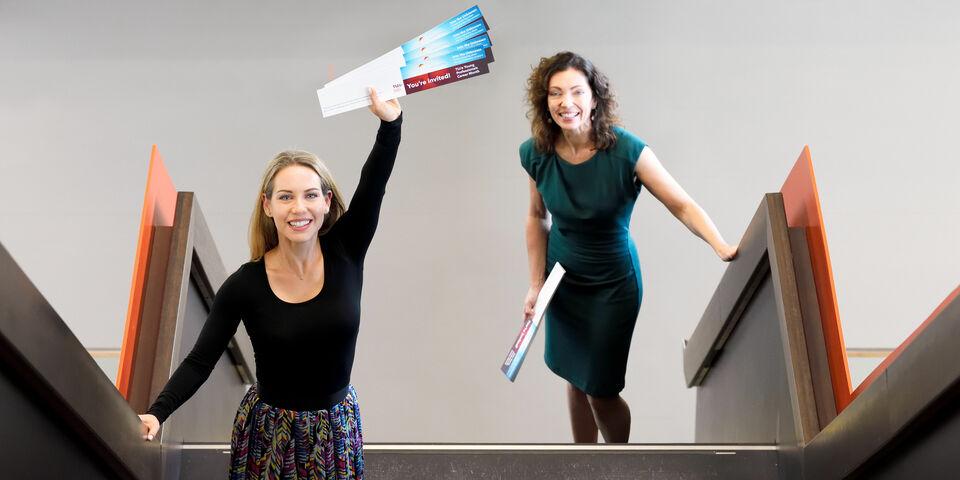Career month very popular among young scientists
The Young Professionals Career Month is fully online, lasts practically the entire month of October, and offers PhD candidates, PDEng trainees and postdocs several workshops, expert sessions, lectures and speed coaching. A maximum of 1000 participants will take part in a total of 95 activities throughout the month, and practically all available seats were spoken for in no time.
The online Young Professionals Career Month is an initiative by Bonnie Beerkens (coordinator of the PROOF program) and Susan Lambriks (coordinator professional development program for Support and Management). “Normally, there is an annual PhD career Event in the Van Abbemuseum. That had to be cancelled this year.”
But virus or no virus: career orientation and the search for jobs continue. And the key to success is to start on time, is the message, particularly with career orientation. But when exactly is that, on time? Beerkens: “A year and a half before your contract as a PhD candidate or postdoc expires, and for PDEng trainees one year before the end of their contract.”
Competition in science
Many people will probably think of the practical side first when they think of career orientation: how can I find a job? “That’s one side of the story, but the part we focus on during Career Month is getting to know yourself. That can a bit scary sometimes, but it is necessary,” Lambriks says. Beerkens: “It’s important to keep asking yourself: where do I want to be in five years’ time? What’s my goal? What do I want to add to this world? You learn what you’re good at, but also what holds you back.”
Competition in science is fierce, and there’s not enough room for everyone, unfortunately. And there are also people who come to realize after some time that becoming a professor isn’t quite the ideal career they had in mind after all. Making the switch to the private industry after years of research, either voluntarily or out of necessity, can be quite a challenge. Beerkens: “Many PhD candidates don’t exactly know what the future holds after they’ve obtained their degree, and they are uncertain about a career in industry. We try to lower the threshold with this event. It’s important to offer this target group alternatives if their final decision is not to pursue a career in academia.”

Postdocs at the front of the queue
Might corona account for the fact that so many people are interested? Beerkens: “I cannot say with certainty. Career events were always well attended, but the target group is larger this year than before (not just PhD candidates anymore, as in previous years, ed.). That might have had an influence.” Lambriks: “I also think that people have gotten more used to online activities.”
And such an online event also offers immediate opportunities: many more people can take part at the same time, which makes it possible for PDEng trainees and postdocs to join in as well this year. Lambriks: “When we look at the event’s entire target group, we see that a relatively large number of postdocs take part. In the past, there were less events targeted at this group. This year is the first time they’re invited to take part in this, and it fits their needs.”
“Career orientation is very important for postdocs,” says Tim Wezeman of the Postdoc Association. “Almost by definition, postdocs have temporary contracts. Some of them have the ambition to be a professor, but not everyone wants to become a professor - or can become one. It’s important to ask yourself whether you’re happy with your current career path and opportunities. If you’re not, it’s time to take action. If you enjoy doing research, like I do, you can move on to do postdoc research after your PhD trajectory. But if you still want to make the switch to the private sector after that, or if you have to, you could run into difficulties. Many professors never held a position in industry and have little or no knowledge of it. You need to be lucky enough to have the right person in your network. Internationals in particular often don’t have that network here. The Career Month can help them with that.”
From industry to university is an option as well
“When it comes to making a decision on your career progress, don’t be afraid to opt for a career outside research, and use it as an opportunity to discover as many options as possible,” says Josefine Proll, assistant professor at Applied Physics. Ward Cottaar, professor of Instrumentation Design, thinks that ‘planning your career’ doesn’t mean ‘predicting the future,’ but “improving your strengths, as well as your weaknesses to a certain extent, so that you’re ready take your opportunities when they present themselves.”
And his own career is proof that the opposite direction, from industry to university, is an option as well. “After an international career of 26 years on the factory floor in industry, and not in research, I was offered a professorship at this university. And that has given me many new challenges and much pleasure.”
Personally, Wezeman doesn’t think he wants to become a professor. “I enjoy doing research, but a professor also spends a lot of time teaching and writing scholarship proposals. That’s not what I’m looking for. But when you’ve spent years doing research only, your attractiveness for the private sector also diminishes. The realization that you need to make a decision, and taking part in the Career Month can certainly help with that. The problem isn’t suddenly solved after a year of workshops, but the process of becoming aware has been set in motion.”
Lambriks: “We want their next decision to be a very conscious one. Not one they made from a survival mode simply because they need to find a job. And that is why it’s important to start with career orientation on time.”



Discussion